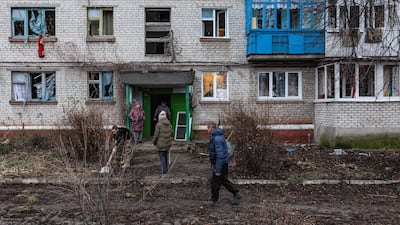Kyiv has denied Moscow's claims to have killed 600 Ukrainian servicemen in a "retaliatory strike" in the eastern Ukrainian city of Kramatorsk to avenge the deaths of 89 Russian troops in Makiivka.
The Russian Defence Ministry on Sunday said the servicemen were killed in the strike on troops stationed in two buildings in Kramatorsk used as barracks.
The ministry did not say when the strike had taken place but claimed Russian intelligence had "over the past 24 hours" confirmed points where more than 1,300 members of Ukraine's armed forces were housed in two buildings in Kramatorsk.
"More than 600 Ukrainian servicemen were killed," the ministry said.
Ukraine's armed forces rejected the claim.
"This information is as true as the data that they have destroyed all of our HIMARS," Sergiy Cherevaty, spokesman for the Eastern group of the Ukrainian armed forces, told the Suspilne media outlet, referring to US-supplied rocket systems. He said Russia could not deliver high-precision strikes.
And one witness told Reuters the Russian rocket strike caused some damage at the site but did not destroy any buildings and there were no immediate signs of casualties.
Reuters reporters visited the two college dormitories Russia's Defence Ministry said had been temporarily housing Ukrainian servicemen close to the front line of the war at the time of the overnight strike.
Neither appeared to have been directly hit by missiles or seriously damaged. There were no obvious signs that soldiers had been living there and no sign of bodies or traces of blood.
Some of the windows were broken at Hostel No 47, which stood by a courtyard scarred by a large crater.
The other building named by the ministry, Hostel No 28, was entirely intact. A crater lay about 50 metres away closer to some garages.
Earlier on Sunday, Pavlo Kyrylenko, the head of the Donetsk regional administration, said Russia launched seven rocket attacks on Kramatorsk.
He said "an educational institution, an industrial facility and a garage" had been damaged and that there were no casualties.
The strike came in apparent retaliation for a New Year attack by Kyiv on a building in the occupied eastern Ukrainian town of Makiivka being used as a barracks.
Russia conceded 89 troops were killed in what was the worst single reported loss from a Ukrainian strike.
Meanwhile, two were killed and nine wounded at the weekend in strikes by Russian forces, despite a unilaterally announced ceasefire by Moscow in Ukraine, Kyiv said.
One person died and another eight were injured in Donetsk in the past 24 hours, Kyrylo Tymoshenko, deputy head of the Ukrainian presidential office, said on Sunday.
Another was killed in the north-eastern region of Kharkiv, while one person was wounded in the southern region of Kherson over the same period, he added.
"Despite the so-called ceasefire declared by the Russian occupiers, over the past day the enemy launched nine missile and three air strikes and fired 40 attacks from multiple rocket launchers," Ukraine's Defence Ministry said in a separate statement.
"In particular, civilian infrastructure was hit."
Russian President Vladimir Putin had ordered a 36-hour ceasefire to allow Orthodox Christians to mark Christmas, which is celebrated on January 7 in Russia and Ukraine.
The unilateral ceasefire ended at 11pm in Kyiv on Saturday.
Weapons supplied to Ukraine - in pictures
Kyiv and AFP journalists on the ground said there was little sign the fighting had eased on Saturday.
"After midnight the enemy launched seven rocket attacks on Kramatorsk and two on Kostyantynivka," said Pavlo Kyrylenko, head of the Donetsk regional administration.
The Russian Defence Ministry said on Saturday it had observed the halt in fighting but repelled a number of Ukrainian attacks and killed dozens of Ukrainian troops.
Ukraine dismissed the brief truce as a tactic by Russia to gain time to regroup its forces and bolster its defences after a series of battlefield setbacks.
Sergiy Gaiday, head of the Lugansk regional administration, said the Russians were redeploying forces from Bakhmut, the current epicentre of the fighting, to the city of Kreminna.
"We are expecting an intensification of hostilities," he added. "Our heavy equipment will finally be able to move forward faster."
Ukrainian President Volodymyr Zelenskyy had rejected the ceasefire order, calling the temporary truce a trick aimed at halting the progress of Ukraine's forces in the eastern Donbas region as Russia brings in more troops.
Ukrainian and Russian forces are facing off over 1,500km of front line, with fighting intensity ranging from almost constant — such as the battle of Bakhmut in eastern Ukraine — to sporadic and almost quiet in some areas — such as the front line near Kherson in the south.
Russia’s war has resulted in a minefield of some 250,000 square kilometres, Ukrainian Prime Minister Denys Shmyhal told South Korea’s Yonhap news agency, an area about the size of the UK.
“It is currently the largest minefield in the world,” Shmyhal said in an interview published on Sunday. “It’s not only making it difficult for people to travel but also causing major disruptions in farming, which is one of our main industries.”












































